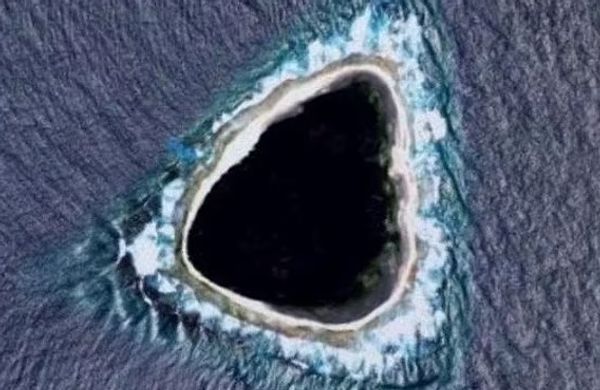One Google Maps user stumbled upon something quite intriguing in the middle of the Pacific Ocean. In October, a Reddit user named Kokoblocks shared an image of a mysterious dark blob in the ocean, sparking a barrage of conspiracy theories. This black hole-like object, which seemed to be the size of 56 acres, raised many questions and speculations. But the truth is, it wasn’t a hole at all. It was actually Vostok Island, a 56-acre uninhabited island owned by the Republic of Kiribati.

The Reddit user posted the image of the enigmatic black island with the caption, “what the F**K this looks nothing like an island.” This image immediately grabbed attention and triggered an avalanche of speculation on the platform.
Various theories began to circulate about the nature of this black hole in the middle of the Pacific Ocean. Some people feared it was the infamous “island from Lost,” the popular television show. Others wondered if the Bermuda Triangle had mysteriously relocated from the Atlantic Ocean to the Pacific.

But in reality, the black spot was none other than Vostok Island, situated hundreds of miles away from the well-known vacation spot of Tahiti. One knowledgeable Redditor explained, “What you see as black is actually very dark green. It’s a dense forest comprised of Pisonia trees.”
These incredible trees can reach heights of up to 100 feet and grow so closely together that they appear as a single layer of color when viewed from above.

Another Reddit user, Jazzlike_Log_709, shared their initial suspicion that the image might be censored. They couldn’t fathom a natural formation being so black in such a shallow, small island. While Google Maps does sometimes blur out military bases and classified locations, it turns out this island wasn’t censored. The dark spot was simply a result of the tall trees densely covering the remote Pacific island.
Located roughly 4,000 miles east of Australia and 1,500 miles west of Hawaii, the island of Vostok is part of the southern Line Islands, which include Malden, Starbuck, Flint, and Caroline. It was first discovered by a group of adventurous Russian explorers in 1820, who named it after the ship they were sailing on during their Pacific expedition. The United States later claimed the island in 1856 due to its abundant guano, a valuable fertilizer during the Civil War era. However, the island eventually came under British control and later became associated with Kiribati when the country gained independence in 1979. Since then, Vostok has been declared a wildlife sanctuary and has been protected.

In 2009, marine conservationist Enric Sala led an expedition to Vostok to study its fish populations and document its natural resources.






